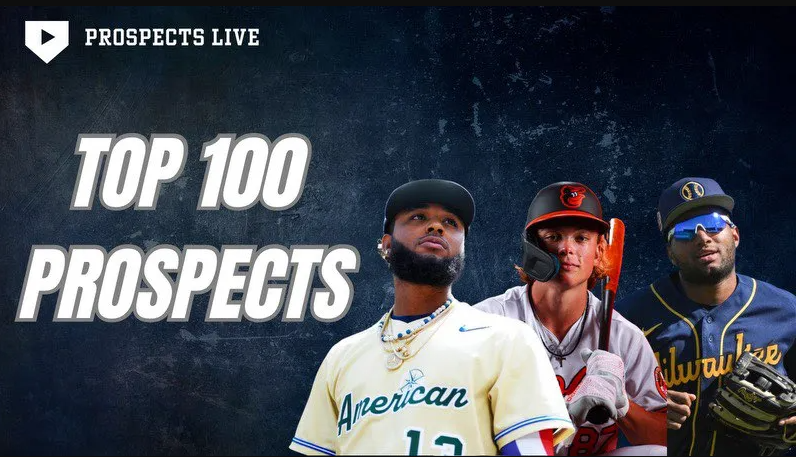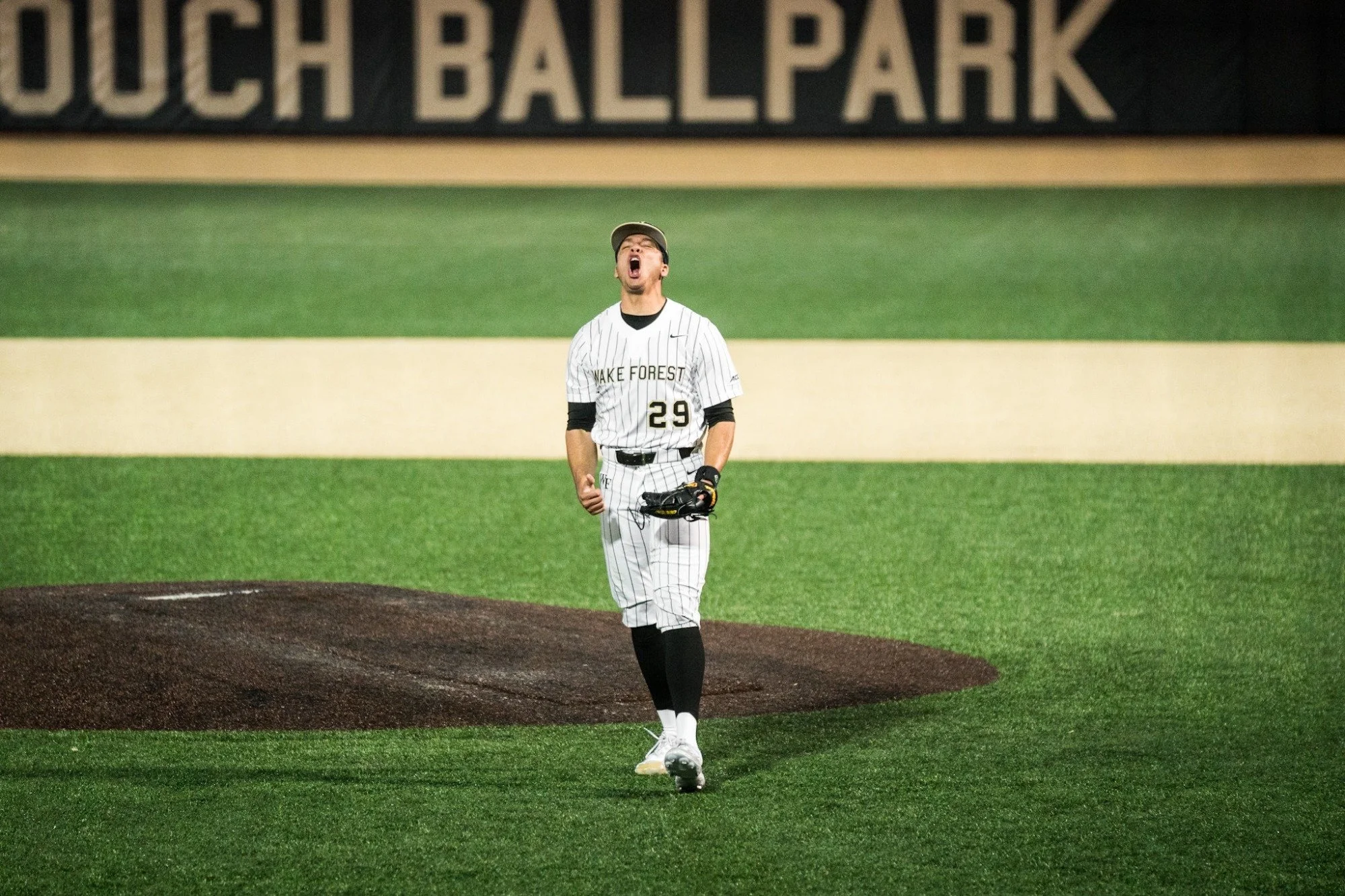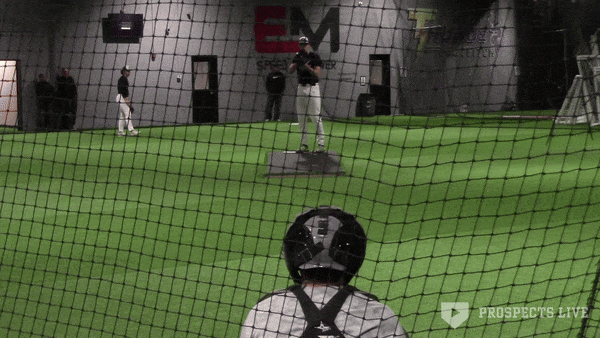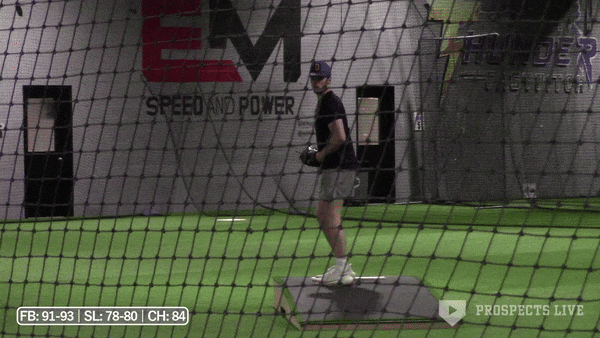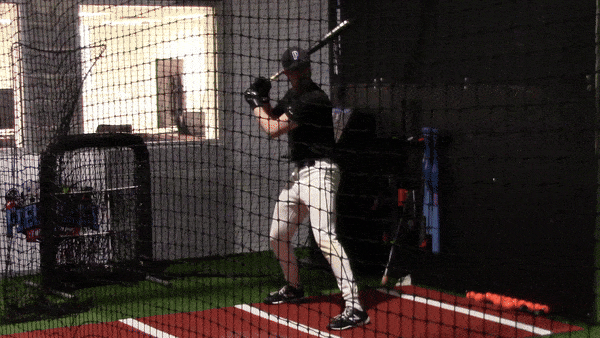Over the weekend, I made my way down to College Station to see two top ten picks face off in Charlie Condon and Braden Montgomery. It was a firework-filled weekend, with the wind blowing out 30 MPH both days, and there was plenty of offense on display. Below are some players that I liked.
2024 Eligible Players
Charlie Condon, 3B/OF, Georgia
Condon is one of the best fastball hitters I can remember. The list of power hitters who can cover the top of the zone as well as Condon does is incredibly short, and it includes names like Corey Seager, Manny Machado, and JD Martinez. It’s an incredibly flat bat path that is geared to hit the bottom of four-seamers with authority. It’s double plus raw power that he gets to in-game consistently, and Condon is consistently hitting balls 100 MPH+, with what feels like a 110+ a few times a week. He saw more spin vs the Aggies than he did vs any team this season. He didn’t chase much, but there was some swing and miss in the zone, specifically on same-handed changeups and stuff coming toward him. Alas, he adjusted and punished a right-handed slider off the scoreboard to extend the Dawgs lead in game three. I’d imagine he’ll continue to get spun and see less and less pitches to hit after this weekend and would expect him to adjust.
Condon played third every game this weekend. It looks a little clunky, but he’s a good enough athlete to make it work. He’s got solid hands and a nice first step, but the footwork and ability to throw from different arm angles is the question mark here. If I was the team drafting him, I’d throw him in right field to get his bat to the bigs as soon as possible. He’s an average runner at his top speed, but he looks more like a fringe runner going forward.
Braden Montgomery, RF, Texas A&M
Montgomery has had top-ten pick buzz since he got on campus at Stanford. Since transferring to Texas A&M, it looks like he has an even better chance to go top five, and maybe sneak into the top three. His swing looks much more connected (especially from the left side) and he’s making better swing decisions. There isn’t much adjustability in his swing, so there’s some swing-and-miss on soft stuff away, but he gets really good plate coverage and will hammer just about everything else. Like a lot of switch hitters, Montgomery has more loft and ability to pull from the left side, and more opposite field and contact driven from the right. His double plus raw power was on display this weekend, hitting a single 116 MPH, and hitting a homer 450 feet. There’s some swing and miss here, specifically soft away, but he’s hammering everything else.
Defensively, Montgomery is passable, but his bat carries his profile. He doesn’t get great reads or take great routes, but he makes the plays he needs to. Alas, he does possess double plus arm strength, but usually it takes a long wind up for him to get to it. He’s a below average runner, sp he should have a home in right long term.
Ryan Prager, LHP, Texas A&M
The left-hander Prager isn’t a guy that lights up a radar gun or TrackMan dashboard, but he’s incredibly deceptive. His funky over the top delivery creates a tough angle to go with his cutting and riding fastball that he commands incredibly well. His go-to secondary is a high-70s splitter that falls off the table when combined with the steep plane his arm slot creates.
His breaking balls play now and should be at the lower levels of the minors, but eventually, I think some refinement will be necessary. Right now, he only throws short, sometimes gyro, low-80s slider. It plays well thanks to his feel for it, but going forward, I’d like to see him throw it in the mid-80s. I also think adding a curveball would do him well, especially given his high arm slot, perhaps even the trending “Death Ball”. Prager is a fun crafty lefty who looks like he’ll go in the 4th to 5th round.
Chris Cortez, RHP, Texas A&M
Cortez has had an electric right arm since he got to College Station, but there was inconsistency not only in command and mechanics, but he often had a hard time repeating his fastball shape and even velocity. Now, Cortez looks like the guy we’ve been waiting for. He pitched twice over the weekend, sitting 98-100 MPH, touching 101, with consistent plus sink and above-average run. His slider was in the mid-80s with above-average sweep.
Cortez is a smaller guy with a lot of effort and without a track record of strike-throwing. It’s possible a team could try him as a starter but sticking him in the bullpen should fast track him to the bigs. I do have some questions about his bat-missing ability once he gets into pro ball. He lacks the high, over-the-top arm slot you see a lot of bat-missing sinker ballers have and his feel for his slider isn’t great, getting a little too big at times. This isn’t to say he can’t be successful, but it’s more so I think he's a 6th or 7th inning pitcher as opposed to a setup guy or closer. It’s reminiscent of Brusdar Grateral to me. I like him to go in the 3rd to 5th round.
Slate Alford, 2B/3B, Georgia
Alford is a pretty typical power hitter at the plate. Burly, physical player who possesses plus bat speed and a steep bat path. While there is some swing and miss here, my bigger question is regards to his load. It’s very long and left him late on some normally hittable fastballs. Alford chases a good bit but has an all-fields approach and hits the ball really hard.
Defensively, Alford has moved around between second and third primarily and stayed at second this weekend. His range is limited, and he’s got solid hands, and has an average arm, but the accuracy is the question mark here. If he can show consistency in his throws across the diamond, he should have a home at third.
Ali Camarillo, SS, Texas A&M
Camarillo’s calling card is his defensive prowess. It’s plus hands and actions, above-average range, and really nice footwork. His arm strength is above average, but he shows great arm utility, throwing from multiple angles as well as from both feet. From the right side of the plate, Camarillo makes pretty good decisions and shows nice bat-to-ball skills. It’s an opposite field-driven approach with the ability to turn on inside pitches if he recognizes it. There isn’t much bat speed or impact, and the swing is pretty handsy so there are certainly some questions about his ability to hit high level pitching, but the glove should keep him on the field. He has the looks of an early day 3 pick.
Kolby Branch, SS, Georgia
A draft-eligible sophomore, the Baylor transfer is the everyday shortstop for the Dawgs. Branch has solid range going to his left and right, along with above-average hands and actions. It’s fringy arm strength, which holds him back from making plays deep in the hole, but really nice arm utility going to his left and coming in. He’s likely suited best for second base, but could certainly play shortstop in a pinch.
At the plate, Branch has a fairly rotational uphill swing from the right side. There’s some swing-and-miss here but he doesn’t chase much and covers the outer third pretty well. Given his size, Branch hits the ball hard consistently, and his ability to pull the ball in the air should help his power play up a half-grade or so. He looks like a late day two or early day three guy, depending on his price.
Other 2024 Players of Note
Fernando Gonzalez, C, Georgia
Gonzalez doesn’t have much impact at the plate, but he’s really solid behind the dish. He’s a nice blocker, an above average receiver, and has gotten rave reviews for how he handles pitchers. In an age where catchers are hard to come by, Gonzalez might have a place in pro ball.
Christian Mracna, RHP, Georgia
Mracna came in and closed out the final game of the series for Georgia. The right hander blew riding fastballs at 92-94 MPH by the heart of the Aggies order and flashed a nice top spinning changeup. It’s a three-quarters delivery and combine that with his riding fastball and extension and you get a dude that’s going to miss a ton of bats up in the zone.
Side note: There was a lot of talk after the game about Mracna going to his glove in between pitches, assuming for sticky stuff of some kind, Chris Cortez was going to his belt in between pitches too. Plenty of pitchers are using sticky stuff at this level, and I hope this shallow finger pointing at pitchers who are simply trying to get consistent grip on inconsistent baseballs doesn’t make its way to college baseball.
Corey Collins, 1B/DH, Georgia
Collins was injured for a lot of his draft year and it resulted in him coming back. He’s been healthy this year and is mashing. He features a compact rotational swing with easy bat speed and loft from the left side and not much chase. He’s not catching anymore and mostly DHing and playing 1st. Add in some swing and miss concerns and he’s likely a day three pick.
Brian Zeldin, RHP, Georgia
Zeldin is a right-handed Penn transfer with a wide array of quality pitches coming from a high three quarters slot. He features a low-90s riding fastball, high-80s gyro slider, high-80s changeup, low-80s sweeper, and 79-81 MPH curveball. He’s struggled with control in this game but was also asked to come in in the first inning, something he isn’t used to.
High Follows
Jace Laviolette, CF, 2025, Texas A&M
Laviolette is a guy who catches your eye as he walks off the bus. At 6’5”, he’s an imposing presence in the box and there’s plenty of power to go with it. It’s double plus raw power and easy bat speed, and you’ll see shades of Matt Olsen. When his swing is on, he has lightning quick hands and is able to cover most parts of the plate, including the inner third, something you wouldn’t expect given his long limbs. However, Georgia pitched him incredibly well and got his swing out of whack, staying soft away and forcing his swing to get handsy. He sees the ball incredibly well and hardly chases. The next step for him will be swinging at better pitches in the zone, and/or making more contact without sacrificing power.
Defensively, Laviolette gets great jumps and reads in centerfield. He’s also an above-average runner and really glides around the outfield. Whether he stays in centerfield or not will depend on how much he fills out and is able to maintain his speed, if not, his average arm likely puts him in left field. Laviolette is a hell of a player, and for my money is the best in the 2025 class right now.
Gavin Grahovic, 3B, 2026, Texas A&M
Grahovic is the leadoff hitter for A&M’s three headed monster of likely first rounders at the top of the lineup. Grahovic’s rotational right-handed swing creates plus raw power that he gets to in game. He’s shown the ability to pull the ball in the air and hit it hard consistently. There’s some swing and miss, but that’s to be expected from a freshman playing every day. For a freshman, he’s shown nice plate skills that will continue to grow with age. Defensively, he has a great first step and has really nice range. It’s a below-average arm but good utility. I’d be curious if he gets some looks at shortstop next fall, he is an above average runner after all.
Shane Sdao, LHP, 2025, Texas A&M
Sdao came out firing from the left side on Saturday for the Aggies, sitting 93-96 T97 MPH with good carry from a three-quarters slot. His slider flashed plus, with nice sharp sweep at 79-82 MPH, and was average more times than not. He also flashed some changeups with good depth and good separation from his fastball. He threw plenty of strikes and put his fastball in good spots. Sdao has a starter mix and has started 3 games in his career, but Coach Schlossnagle has said he’s had more success out of the ‘pen. It will be interesting to see what role he slides into for his draft year next year.
Kolten Smith, RHP, 2025, Georgia
Smith started the final game of the series for Georgia and did not disappoint. He held mid-90s into the 6th inning, and showed feel for 3 offspeed pitches. His fastball gets good shape coming from a high three-quarters arm slot and it played up in the zone. His go-to secondary was a low-80s sweeper, that he would manipulate to have a more curveball shape at times. It gave a unique look to hitters and forced them to pick a shape when picking that velo range. He also flashed a high-80s gyro slider that showed more sweep than the traditional gyro slider. He turned over some high-80s changeups as well, featuring nice top-down movement while maintaining fade. Smith looks like a steady piece for the Bulldogs’ rotation in 2024, with a chance to in the first five rounds in the draft.
Leighton Finley, RHP, 2025, Georgia
Finley started Friday night for Georgia and came out holding mid-90s for five innings and 90 pitches. It didn’t have great shape but his three-quarters arm slot allowed it to play. His best pitch was a top-spinning upper-80s changeup. He showed good feel for this pitch and it gave left-handed hitters fits. He also flashed a 78-81 MPH sweeper. It was a bit easy to see out of the hand and got a little too big at times, but it flashed plus. He didn’t have a great feel for it, so having something a little harder that moves to his glove side could help it play more, even if it’s not always in the strike zone. Finley looks like another solid piece for the Bulldogs rotation in 2024, and should have a good chance of going of going in the first five rounds of the draft.
Justin Lamkin, LHP, 2025, Texas A&M
Lamkin is a crafty left-hander who slings it from a low three-quarters slot. His fastball is 89-92 MPH with good, running two-seam action. He shows solid command of it, especially to his glove side and up in the zone, where it plays thanks to his slot. He mixes in his tight spinning, low-80s gyro slider to both right-handers and left-handers. It plays for now thanks to how good of feel he has for it, but I’d like to see him add some velocity to it. He’ll also turn over a solid 81-84 MPH changeup that has more tumble than fade. Lampkin has a really nice foundation right now, with feel for three quality pitches. If he adds a tick or two of velocity, which isn’t unrealistic given how good A&M has shown they can develop, watch for him to go in the top 100 next year.



